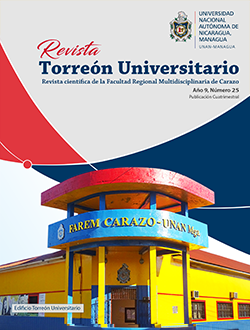Simulation as a didactic strategy in teacher training practices. Experience in the Social Sciences career
DOI:
https://doi.org/10.5377/torreon.v9i25.9851Keywords:
Social Sciences, teaching skills, didactic strategies, simulationAbstract
This article on educational innovation arises from a process of pedagogical reflection that aimed to use simulation as a teaching strategy to develop pedagogical skills in teachers in training of the social sciences area, in the subject Specialization Practices of the Social Sciences major. The methodology consisted in developing a mixed study, with emphasis on the qualitative approach, applying research techniques such as observation, survey and interviews to the research analysis unit that was composed of twenty-eight students enrolled in the subject. The didactic intervention resulted in the development of the ten teaching skills set out in the subject, which was evident in the simulations that the students carried out during the course of the subject. This study shows that simulation is a didactic strategy that favors the training of education professionals and allows the protagonists to assume roles similar to those they should assume in reality, and therefore, to appropriate the role, knowledge, attitudes, values and skills that this field requires to perform effectively.
Downloads
Downloads
Published
Issue
Section
License
The authors who publish in this journal agree to the following terms.
- The author or authors of the articles, essays or research grant the National Autonomous University of Nicaragua, Managua (UNAN-Managua) the editing rights (copyright) of the submitted work, therefore the University has the exclusive right to publish the article for the entire copyright period.
- These copyrights/authors authorize Torreón Universitario Magazine and the University to edit and disseminate/publish the article in said Magazine, including printed and electronic reproduction, storage, retrieval and any other type of publication, and sources of secondary information as services. of summaries and databases, they also empower it to protect the article against unauthorized use for dissemination by printed or electronic media (PDF, HTML, EPUB, XML or others).
License for use of content
The magazine uses the Creative Commons Attribution-NonCommercial-NoDerivs 4.0 International License.
Under this statement:

This journal is licensed under a Creative Commons Attribution-NonCommercial-NoDerivatives 4.0 International License. It can be copied, distributed and transmitted publicly as long as the author and source are cited (Revista Torreón Universitario), it should not be modified or used for any commercial purpose. The full license can be found at http://creativecommons.org/licenses/by-nc-nd/4.0/.



